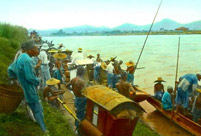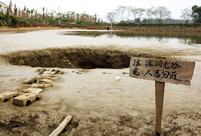

WUHAN, April 17 -- Both foreign and Chinese experts questioned and refuted the Philippines' standing on the South China Sea issue at a seminar that closed on Sunday in central China's Wuhan City.
Manila filed a case with the tribunal that arbitrates maritime disputes under the UN Convention on the Law of the Sea (UNCLOS) on April 3.
However, China has legitimate rights under international law to reject the arbitration, unilaterally initiated by the Philippines, as the UN tribunal has no jurisdiction over Manila's territorial claims to several islands, rocks, shoals and other land features across the South China Sea.
In addition, when ratifying the UNCLOS in 2006, China had the right to opt out of various aspects. One of these was compulsory arbitration of maritime boundary delimitations and historical rights by the tribunal.
The International Seminar on the Application of Compulsory Procedures under the Convention on the Law of the Sea to the South China Sea Arbitration initiated by the Philippines, discussed topics including the nature of the dispute, historic rights and maritime features.
More than 30 scholars and experts from Austria, Canada, the Republic of Korea, Switzerland, Britain, and the Chinese mainland and Taiwan attended the seminar.
Dean of the China Institute of Boundary and Ocean Studies at Wuhan University Hu Dekun said the origin and nature of the South China Sea dispute was the Philippines' illegal occupation of the Chinese islands and reefs, thus, he called on international law scholars to consider the South China Sea Arbitration in compliance with history and facts.
Hu shared how Chinese people first discovered and used the South China Sea islands, and how successive Chinese governments have enjoyed the sovereignty and have been exercising jurisdiction over the South China Sea islands for a long period of time.
Xiao Jianguo, deputy director general of the department of boundary and ocean affairs, under the Ministry of Foreign Affairs, restated China's position on the issue, namely, non-acceptance, non-participation, non-recognition and non-implementation.
Xiao said the Philippines' unilateral arbitration was not a simple legal case, but political provocation under the cloak of law, which has gravely hindered mutual political understanding between the two sides, and constitutes a serious threat to regional cooperation.
Gao Zhiguo, a judge with the International Tribunal on the Law of Sea and a researcher with the China Institute for Marine Affairs under the State Oceanic Administration, said the current arbitration has failed to reach the goal of settling disputes and proposing solutions.
Gao said the tribunal had deviated from a just and objective stance due to the apparent bias in favor of the Philippines.
Thomas Cottier, professor at the University of Bern, Switzerland, said the exclusive economic zone delimited by China does not impede freedom of navigation in the region.
He said China's non-acceptance and non-participation position is understandable, as the case is not simply a legal dispute, but involves political factors, and the arbitration initiated by the Philippines is unable to solve the dispute.
Fu Kuncheng, director of Xiamen University's South China Sea Institute, said the essence of the case is sovereignty and delimitation, adding that China should step up the research and expounding of its historic rights, which does not come into conflict with the statutory rights given by conventions.
Hyun-soo Kim, professor at Inha University in Republic of Korea, said China and the Philippines should try to settle the dispute through negotiation.
Kim said the Declaration on the Code of Conduct on the South China Sea, signed by China and ASEAN, could the legal framework for the settlement of the issue.
The two-day seminar was hosted by the Collaborative Innovation Center for Territorial Sovereignty and Maritime Rights and Wuhan University China Institute of Boundary and Ocean Studies.
 The evolution of J-10 fighter
The evolution of J-10 fighter Top 10 Asian beauties in 2016
Top 10 Asian beauties in 2016 What's happening in Xisha Islands?
What's happening in Xisha Islands? When female soldiers meet flowers
When female soldiers meet flowers North Sea Fleet conducts drill in West Pacific Ocean
North Sea Fleet conducts drill in West Pacific Ocean Old photos record the change of Sichuan over a century
Old photos record the change of Sichuan over a century Breathtaking aerial photos of tulip blossoms in C China
Breathtaking aerial photos of tulip blossoms in C China Horrific: Pit swallows 25 tons of fish overnight
Horrific: Pit swallows 25 tons of fish overnight Vietnamese Su-30 fighters fly over Nanwei Island in South China Sea
Vietnamese Su-30 fighters fly over Nanwei Island in South China Sea Top 20 hottest women in the world in 2014
Top 20 hottest women in the world in 2014 Top 10 hardest languages to learn
Top 10 hardest languages to learn 10 Chinese female stars with most beautiful faces
10 Chinese female stars with most beautiful faces China’s Top 10 Unique Bridges, Highways and Roads
China’s Top 10 Unique Bridges, Highways and Roads Student lottery strands young Chinese in US
Student lottery strands young Chinese in US Gay marriage ruling marks progress in societal openness
Gay marriage ruling marks progress in societal openness China watchdog cracks down on illegal live streaming platforms
China watchdog cracks down on illegal live streaming platforms North Korean restaurants face rocky future in China as sanctions bite, staff defect
North Korean restaurants face rocky future in China as sanctions bite, staff defectDay|Week